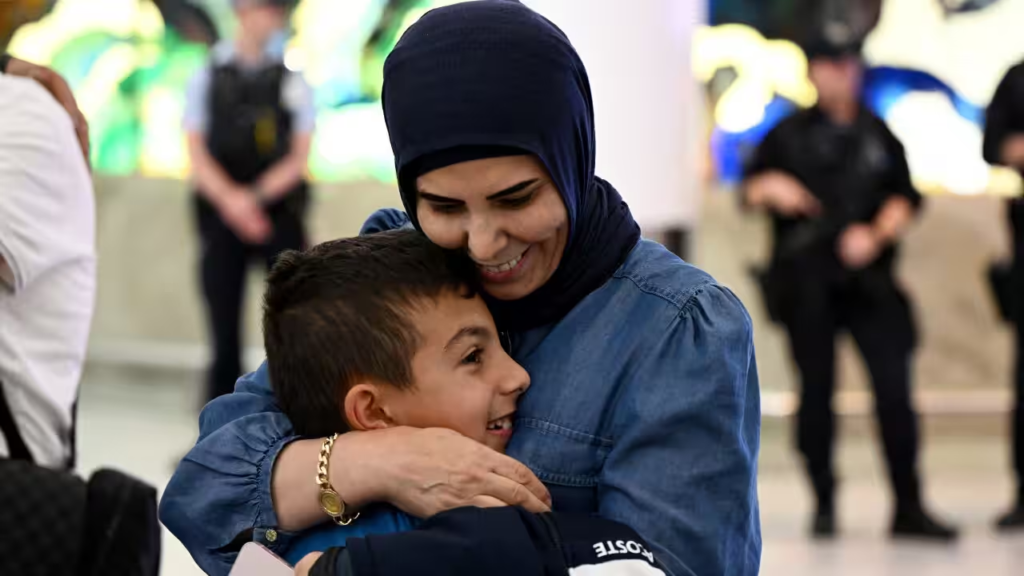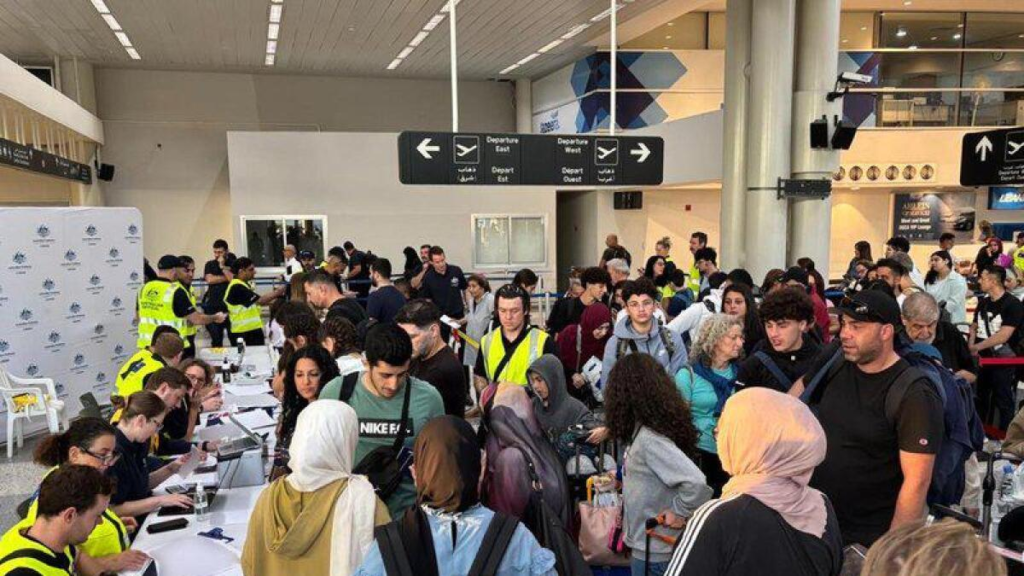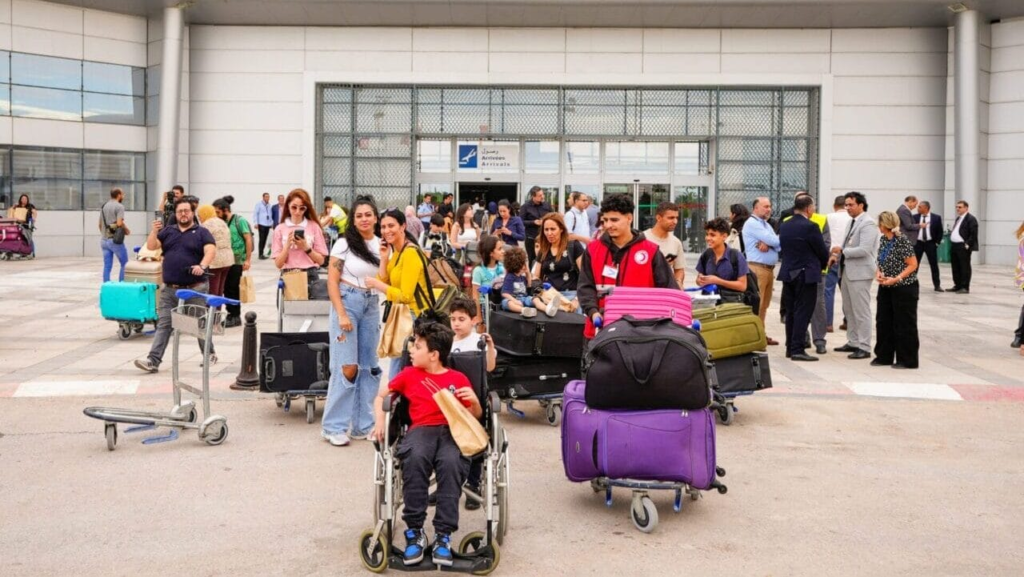349 Australians Evacuated from Lebanon In the midst of escalating tensions and violence in Lebanon, hundreds of Australians have found a path to safety through government-assisted repatriation flights.
The evacuation has been a response to the deteriorating security situation in the region, largely driven by ongoing conflicts between Israel and Hezbollah. The successful repatriation of these Australians marks a significant effort by the Australian government to protect its citizens during times of crisis.
The Evacuation Effort: A Lifeline for Stranded Australians
The repatriation of 349 Australians from Lebanon to Sydney is a result of coordinated efforts between the Australian government, Lebanese authorities, and international partners.
Read : Lebanon Shelters Are Full Amid Displacement Crisis: UN
The flights, which departed from Beirut and connected through Larnaca in Cyprus, provided a critical escape route for those caught in the conflict. The operation involved multiple flights, with one major Qantas flight already bringing back 349 Australians, and another flight expected to return an additional 220 people.
Upon arrival at Sydney Airport, passengers were greeted with emotional reunions with family members. Many expressed their gratitude to the Australian government for facilitating their safe return.
The government’s swift action in organizing these flights has been praised by many, with Foreign Affairs Minister Penny Wong posting on social media about the success of the mission, welcoming home the evacuees and acknowledging the hard work of all involved in the operation.

The evacuations were part of a larger humanitarian response to the violence in Lebanon, where Israeli attacks in the south have led to mass displacement.
Lebanese authorities estimate that over 1.2 million people have been forced to flee their homes, with nearly 2,000 deaths reported. As the conflict continues, the need for further evacuations and humanitarian assistance remains critical.
Rising Tensions in Lebanon and the Role of Hezbollah
Lebanon has become a new front in the ongoing Israeli-Palestinian conflict, with tensions spilling over into the country’s southern region. Israel’s military actions in southern Lebanon have been primarily aimed at Hezbollah, a militant group that has been launching attacks against Israel.
These skirmishes have displaced thousands of people on both sides of the border and have drawn international attention to the escalating violence in the region.
Hezbollah, an Iran-backed Shiite militant group and political party, has long been a source of tension in Lebanon and the broader Middle East. The violence in Lebanon is part of a broader pattern of instability in the Middle East, where political, sectarian, and military conflicts often intersect.
The group is considered a terrorist organization by several countries, including the United States and Israel, though it also operates as a legitimate political entity in Lebanon. Over the past year, the conflict between Hezbollah and Israel has intensified, with repeated bombardments and ground operations.

The Israeli-Palestinian conflict has long been a focal point, and the recent flare-ups have had a significant impact on neighboring countries, including Lebanon. The humanitarian toll has been severe, with both Israeli and Palestinian civilians suffering the consequences of the ongoing violence.
Domestic and International Responses
The Australian government’s role in evacuating its citizens from Lebanon has highlighted the importance of diplomatic and logistical coordination during international crises. The evacuation efforts were part of a broader response that involved the Australian embassy in Lebanon, international partners, and Qantas airlines.
The Australian government has consistently emphasized the safety of its citizens abroad, particularly in regions experiencing conflict.
Domestically, the evacuations have drawn attention to the broader geopolitical issues at play in the Middle East, as well as Australia’s foreign policy stance on the Israeli-Palestinian conflict.
The conflict has sparked discussions within Australia, with vigils and public events held across the country to mark the one-year anniversary of the Hamas attack on southern Israel. The attack, which led to the deaths of 1,200 Israelis and resulted in the capture of 251 hostages, has been a point of tension in Australian political discourse.
At one vigil in Melbourne, Prime Minister Anthony Albanese faced jeers from some attendees, reflecting the divided public sentiment on the issue. Opposition Leader Peter Dutton, on the other hand, was met with a standing ovation at a similar event in Sydney, where he reiterated his support for Israel’s right to defend itself against existential threats.
Dutton’s comments on the need for “moral clarity” in dealing with the Israeli-Palestinian conflict resonated with many in the crowd, who expressed frustration over what they saw as insufficient support for Israel from the Australian government.
Internationally, the conflict has drawn responses from world leaders, including US President Joe Biden, who has expressed deep concern over the humanitarian toll of the violence. Biden has called for a ceasefire in Gaza, highlighting the need for humanitarian aid and the protection of civilians, while also supporting Israel’s security needs.
The complex nature of the conflict, involving state actors, militant groups, and civilian populations, has made diplomatic resolutions difficult, but the push for peace remains a priority for global powers.

In Australia, the political landscape has been shaped by both the crisis in the Middle East and domestic concerns. Recent polling indicates that voters are holding the Labor government accountable for rising living costs, which have become a central issue in Australian politics.
The Resolve Political Monitor shows that 58% of respondents are struggling to manage their household budgets, with 36% attributing the financial strain to government policies.
Despite these economic challenges, Prime Minister Albanese has remained ahead of Dutton as the preferred leader, though the gap between the two has narrowed in recent months. Albanese’s government is also grappling with stalled legislation on key issues such as housing affordability, early childhood education pay increases, and environmental protection.
The political climate in Australia is likely to remain turbulent in the coming months, as the government seeks to navigate both domestic and international challenges.
The evacuation of 349 Australians from Lebanon underscores the Australian government’s commitment to the safety of its citizens abroad, particularly in conflict zones.
The operation, carried out in coordination with international partners, has provided a lifeline to those affected by the violence in Lebanon. As the conflict between Israel and Hezbollah continues to displace millions, the need for further humanitarian assistance and diplomatic intervention remains critical.
Domestically, the situation has sparked discussions on Australia’s role in international conflicts and its foreign policy stance in the Middle East. The divergent responses to political leaders at recent vigils highlight the complexity of public opinion on the Israeli-Palestinian conflict, as well as the broader humanitarian crisis in the region.
As Australia continues to play a role in international efforts to address the violence, the government’s actions at home and abroad will be closely watched by both its citizens and the global community.

